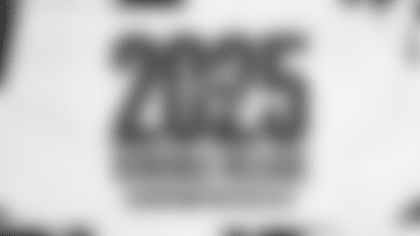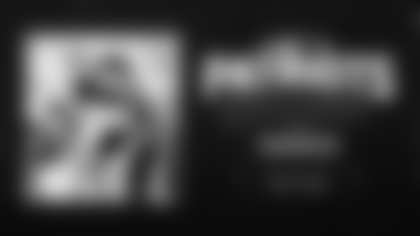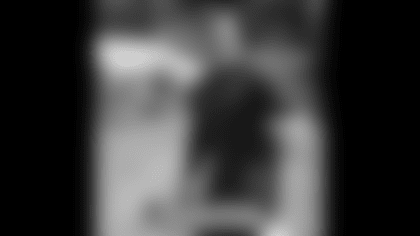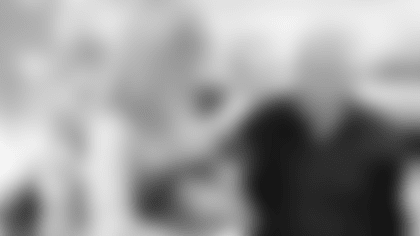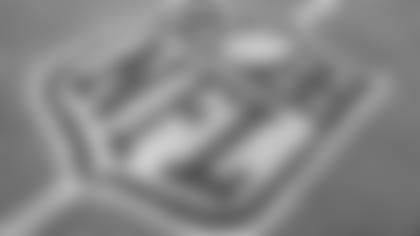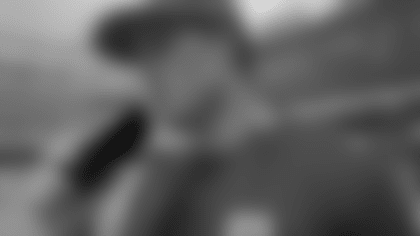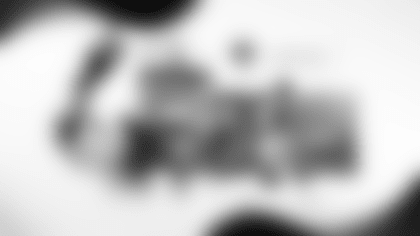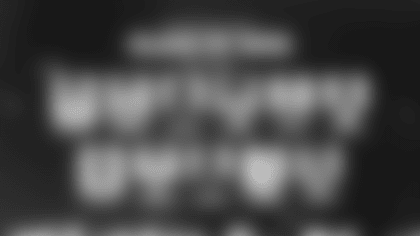[

]()
BB: I guess we used up all of our good stuff yesterday on Arizona. The crowd is here today. Well, I will just turn it over to you. I don't want to be repetitive here.
Q: What is the toughest message you and the coaching staff have to get through to your team playing a team like the Cardinals who you haven't played since 1999?
BB: Well, I think two things. Really, I think this is the toughest situation that we have had. This is actually tougher than Houston last year because at least Houston had the same coach and staff and system in place for a year and a half, whereas here Coach [Dennis] Green has just gotten there. He has had one regular-season game and some preseason games and a lot of new people. He has turned over quite a bit of the roster himself, I think about 40 percent from what it was last year. So, there are a lot of new people that we are not familiar with. There are a lot of new people even from the games that we have seen in preseason. He has a new system that he is building, and I am sure he will install more every week that he plays. From that standpoint, there is a lot of newness there and a lot of unfamiliar territory and we just have to do the best we can to take the information we have and work with it. It is five games and four of them are preseason. [There is] a little bit of a historical background from what he did when he was with Minnesota, and he has been very successful. I doubt that he is going to deviate too much from where his success has been. At the same time, we are working with less information than we usually have. But, that is the way it goes.
Q: How has Emmitt Smith been able to keep the performance level that he has?
BB: That is why he is a Hall of Fame runner. He is an incredible player. I think that his production from high school through college and professionally has just been exceptional. He has a lot of power for his size, similar to Curtis Martin, but probably a little more power. He runs with really good body lean. He has great vision. He has an excellent feel and knack for picking the holes and for making good cuts particularly in the inside running game. He makes a lot of his yardage from tackle to tackle because of his great vision and his ability to see blocks and also set them up and create it. He is a strong runner. He is a hard guy to bring down. He plays with very good pad level. He doesn't fumble because his pad level is so good. He protects the ball with his shoulder pads, and he has really good lower body strength. He has good leg drive. He is just a hard guy to get on the ground.
Q: What areas do you want to improve on this week?
BB: Well, we can improve in every area. I think all three phases of the game. Are you talking about relative to last week?
Q: Yes.
BB: I think we can improve in every phase of the game. There wasn't anything that we ran consistently on offense. Our troubles on defense are well documented, and we didn't get hardly any production at all out of our return game and on special teams. Those are three places to start.
Q: After Deion Branch muffed the punt, do you or Brad Seely talk to him about what he did wrong or is it so obvious that there is not a player-coach conversation?
BB: No, we definitely talk to him. Look, every situation is different, but a lot of times a player will say when you tell him, 'Okay, here is what you did wrong.' He will say, 'Look, I know what I did wrong. I know the mistake I made.' Okay, great. But the other 10 guys need to know it, too. The other 10 guys need to know who was wrong. Were they wrong or was the player you are correcting wrong, just to clear it up so that the other 10 guys [can say], 'Okay, you did the right thing. We had one mistake here. We got that corrected. He will get it right the next time and we will be okay,' versus other guys sitting there saying, 'Well, gee that was a problem. Let's see, should I have done something differently? Was I okay?' That type of thing. I think you do want to correct the mistakes whose ever they are. I am not trying to single out anybody's mistakes, try to correct it so that everybody can get on the same page and say, 'Okay, here is the play. These eight guys are okay. These three guys, here is what you could have done a little bit better,' or, 'Here is how we need to play it.' 'You other eight guys, you stay right where you are. We are okay where we are.' That is how you can get better as a team is to try to make sure that the people who are on a particular play or executing a particular assignment, that they know that they are okay. Then someone else has to make a little bit of a adjustment.
Q: I appreciate that that is valid, but in this case nobody was back there. It was Deion's fault for not catching it.
BB: Well, yes. It is like a receiver drops a pass, you are not going to go up to the guard and say, 'Hey.' The receiver dropped the pass. But you still make the correction. 'Here is your hand placement,' or, 'Here is how you could have handled the ball better. Here is what you could have done to prevent that from happening.'
Q: Do you think he was thinking as a kick returner, that it is a live ball and I have to get it?
BB: No. He wasn't thinking that.
Q: Can I ask you why you used Tyrone Poole on that first punt return and then Branch? Was there something about that situation where you felt like Deion would be better suited?
BB: No, we went into the game planning on having the possibility of using both players. We were playing a lot of defense out there. Both guys have done it. We are comfortable with either guy back there. Obviously, we made a mistake.
Q: In general, do you not want to see punt returners, you see them sometimes punt short. They run up to it and they slide and try to make the catch, and you know what they are thinking, that they are going to get the bounce, 'If I let this bounce, it could bounce 20 yards back behind me.'
BB: That is probably true.
Q: Well, there is obviously the danger of the ball not bouncing in the correct direction.
BB: That is what a player's judgment is. That is why they are out there. That is why you put those guys out there, is to make those decisions. They have to make them based on what they see at that time. Whether or not to throw it, whether to catch it, whether to try to cut the guy on a block, whether to try to stay up high. All of those things are decisions that players have to make after the ball is snapped when they only have a split second to make them based on what is going on at that time and every player has to make those out on the field. That is why they are players. That is why they are in the NFL, to be able to do those things. A lot of them are hard. That is a decision they have to make, sure. Absolutely. The punt returner wants to catch every ball he can get to. As a coach, you want him to catch every one. You don't want the ball to hit and sit there and let it roll 15 yards. That is what they do in college.
Q: Can you talk a little bit about the running back that you picked up last week, Rabih Abdullah?
BB: He was with Tampa Bay for a few years and then Chicago. He is a good sized back, 225-230 [pounds] a really physical guy. He played well in the kicking game for both teams. I think that he gives us some versatility in the back field offensively and also gives us a player with good special teams experience. We will try to get him indoctrinated into our system and see what possible role that might have for him in those two areas, both offensively and in the kicking game.
Q: So he is not someone who has experience as a third-down back?
BB: He played on third down for Chicago last year, yes.
Q: So he is sort of a bigger third-down back, he is not scat back?
BB: No, he is no scat back. He is a big linebacker looking type of kid. I would say about 225, 230, and strong, a powerful guy.
Q: How does he catch?
BB: Good. Good enough. He has played on third down. I think he has the skills to play on all four downs, let's just put it that way.
Q: What is the status of Kevin Faulk?
BB: We will have the injury report at the end of practice today, 4:00 p.m.
Q: I could understand why you might rotate your offensive linemen because of the weather this weekend, but are you going to continue that process?
BB: Well, we will take it week-by-week. We will see how it goes. We may do more or less of that this week. We will make an evaluation after that or take the situation as it comes.
Q: Are you in the process of evaluating guys?
BB: Well, how they play together, we have a couple of guys playing different positions. Sure. Every time a player steps out on the field, he gets evaluated. So does a coach for that matter. You are in this game to be evaluated. That is what your performance is. It is evaluated on a play-by-play and a week-by-week basis for all of us. Anybody that is not looking for that should deliver mail.
Q: Did Arizona do things in their first game that they did in the preseason?
BB: Yes.
Q: So, some of the preseason tapes that you have are worthwhile?
BB: Well, there is some carryover. There are some things that were different. There were some things that were probably done specifically for the Rams. There were some things that were probably added to their system that may have been added against any first opponent just as a progression. [Larry] Fitzgerald played very little in preseason, just the first quarter or so against Minnesota. He didn't get back until the Rams game. Some of the things they did with him, they might have done with him had he played in the second preseason game. I don't know. Things like that. Anytime you are putting in a new system and you get that first regular-season game and then the second, third and fourth, you are still building your program and your system as you are going along. There is no way you can have it all in on opening day and be able to execute it. You are always going to be adding things until you get your inventory up to where you feel comfortable with it. Some of it will be very specific after that.
Q: How can you prepare for their quarterback who hasn't played that much in the NFL?
BB: Well, he has played enough. He had a decent amount last year and has played in preseason. He has played in all the games this year. I think there is plenty to see on him. He is a very athletic guy. He moves around back there. He escapes the rush well. He has a good arm and can make the throws. He has a good set of receivers. He is throwing the ball long and short and all the intermediate routes. I think he is a good guy to work with. I thought that [Shaun] King did some good things for them in preseason as well. The same type of guy, mobile, athletic types of guys. We saw a lot of them. I think it is easy to evaluate them. They both look pretty good. They both have good weapons. They have good receivers. They have good tight ends and good running backs with [Josh] Scobey and Emmitt Smith. I don't think there is any problem there. The problem is going to be defending them, not scouting them.
Q: There is a league-wide Pat Tillman tribute this weekend. Do you expect a little more emotion out there in Arizona?
BB: Sure. Absolutely. I would expect that there will be a lot of intensity in the game. There will be a lot of energy in the stadium. Pat played with a great passion for the game and for life. He lived life with a lot of passion and was a very dedicated individual. I am sure that all of those type of characteristics and adjectives in a way transfer over to everybody at the stadium, the fans and I am sure the team. They have had a lot of time to build up for it. In terms of last week, this week, we all know what is going to take place, wearing his number on their helmets. I am sure they are very aware of what he has meant to his family, to his alma mater, to his team, to his country, to all of us.
Q: Did you know him at all? Did you spend much time with him?
BB: Yes, I spent a good amount of time with Pat out at Arizona State when I was down there. They had a pretty good group of guys coming out that year, a defensive tackle, a couple of guys in the secondary, a couple of linebackers. Pat actually played linebacker at Arizona State and then played safety with the Cardinals. They moved him. Damien Richardson, from Carolina, was their safety for Arizona State. From what I know about him, I think that he is everything that probably everybody knows about him. It didn't take too long to get to know him. He kind of wore his passion on his sleeve, and he is what he is. He wasn't a guy that was trying to hide behind any kind of image or anything. He just put it out there. He was very outgoing, and he presented that when you [would] first meet him or probably for people that were with him for a much longer period of time. Everything you hear about Pat is pretty much the same.
Q: Larry Fitzgerald, what did you see from him on film, and does he remind you of anyone else with his style of play?
BB: I think he is a really good receiver, with the two elements of any good receiver being a player that can get open and a player that can catch the ball. He has exceptional hands. He is probably similar to a player that Coach Green had in Minnesota in Cris Carter in terms of his hands and his coordination, his ball skills. I thought Cris Carter, in the course of his career, probably had as good of hands as any player that I ever saw. I think that is a lot to say about Fitzgerald at this point. The guy has only played in one game, but he has good hands. He showed that in college. He showed it in his first professional game. I imagine that there are a lot of things there that they saw similar to what they had seen from a player like Carter with the Vikings.
Q: The Cardinals have invested a lot in their offensive line and they are one of the biggest. Do you see that as one of their strengths?
BB: Definitely. Their tackles are big. I think that their inside guys are big, but they are not the same level of tackles. I think the tackles do an exceptional job of keeping what we call the width of the pocket, in other words keeping the pocket side so that the ends can't collapse it in on the quarterback. I think that all three of those guys, [L.J.] Shelton, [Anthony] Clement and Leonard Davis have a lot in common. They are big. They are athletic. It is almost impossible to power rush them because of their size, and they do a really good job of keeping the pocket wide and giving the quarterback a lot space inside. Sometimes, even if someone gets penetration inside in the pocket, the quarterback has enough room to maneuver. [Josh] McCown is very active with his feet and he can get outside and escape the rush or step up inside and escape it for that matter. They are physical in the running game, and I think that Emmitt is very aware of that, especially on the backside. When the play goes one way, the guys on the backside start to close in on that, and when sometimes those big bodies, like Davis, get on him, they are able to push him and ride him several yards laterally down the line of scrimmage and that creates cut-back seams on the backside of the play which Smith is very good at seeing. I think they do a pretty good job.
Q: Davis plays guard before then they moved him out to tackle. Does he have the speed for that? He seems like he is a pretty big guy to have on the end.
BB: Well, there are other tackles that are faster than him. But, there no tackles that are bigger than him. There are different ways and different styles to play out there. You get those big tackles like Davis, like [Bryant] McKinnie, guys like that, who are a different type of player than guys that don't weigh 380 pounds or whatever he weighs. He [Davis] played right guard last year, but he played left tackle in college at Texas. I am sure it a position that he feels comfortable in and watching him coming out of college, he did a pretty good job there, too. Now they had Mike Williams at right tackle and Leonard at right tackle. They blocked out the sun.
Q: This is Dennis Green's first year in Arizona. How difficult is it your first year when you take over a team? It might seem like you are coaching someone else's team to a certain degree.
BB: Well, you can't worry about that. You just jump in the water and start swimming. It is what it is. When you come into a new situation, a lot of what is there, you can't define. It is just there because it is there. Then you start moving ahead as you can. There are a lot of things that need to be done at all levels. When you are the head coach, you are dealing with, and I can tell you from experience, salary issues, you are dealing with cap situations, roster formations as well as developing an attitude and a mentality of doing things the way that you believe that they need to be done as well as installing a system and trying to evaluate players that are new to you. At least in my case, I was in this division and had a chance to see some of these players and at least compete against them, versus going into an area where you are totally unfamiliar with the team because you haven't played against them and obviously you haven't coached there if you haven't played against it. There is a lot to do, but you understand that when you take the job and it is hard to get it all done in a really short period of time. Even if you go out and win some games and you are successful, it still doesn't mean that everything that you want to try to build in your program is actually fundamentally in place for a while. Sometimes, some things go quicker than others. Sometimes certain areas of your program can be built up quicker than other areas for a variety of reasons




